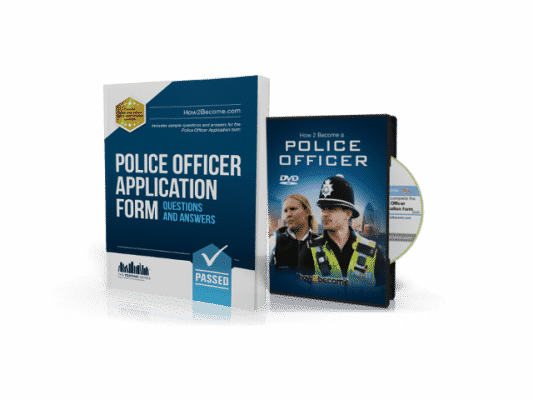In order to become a police officer, one of the first things that you’ll need to do is to complete the online police officer application form. This is a comprehensive form, which takes a significant amount of time to complete. Along with personal questions, you will also be asked competency questions too, so it’s important that you can answer correctly. In this blog, we’ll provide you with some sample police officer application form questions and answers, to give you some idea of the type of response that your constabulary will expect.
The Police Officer Application Form
One of the reasons that the Police Officer Application form is so important, is that it gives you the opportunity to make a first impression with the constabulary that you are applying to. The assessors will pay close attention to your competency based responses, and your answers to any personal questions, to make sure that you are a match. The police need to hire people who fit their values and competencies, and this means that the application form is the ideal stage for them to filter out candidates that aren’t suitable. The competencies that you will be assessed against are as follows:
- Public Service.
- Openness To Change.
- Service Delivery.
- Professionalism.
- Decision Making.
- Working With Others.
IMPORTANT NOTE: Prior to application, it’s essential that you check with your constabulary, to ascertain the competencies that you will be assessed against. As of 2017, some constabularies, including the Metropolitan Police, are using a different set of core competencies. You can find out all about these new competencies, in our fantastic guide.
The Types of Question
Your police officer application form will always ask you basic questions concerning your name, age, address, any criminal record, etc. However, where it differs between constabularies is in the actual written question element. Some constabularies will ask competency based questions. For example, here are some questions on the police application:
‘Give us an example of a time when you have worked as part of a team to resolve a problem.’
Some will ask personal/motivational questions. For example:
‘Tell us the reasons why you have decided to apply for this particular constabulary.’
And some constabularies will ask a combination of both.
Continue reading below to learn how to answer questions on the police application.
Sample Competency Question: Professionalism
Below we’ve listed a sample competency based question, focusing on the core competency of professionalism, followed by a sample response. You will notice in our response that we have followed a very clear structure: listing the issue, then our actions, and then how these actions demonstrated professionalism. In some cases, as we’ve demonstrated here, the police officer application form will have individual sections – that make it easier to follow said structure.
The qualities associated with professionalism are as follows:
- Acts in line with the values and ethical standards of the Police Service.
- Takes ownership for resolving problems.
- Behaves in an ethical manner, challenging unprofessional conduct or behaviour.
- Remains calm under pressure.
When you read our response below, see if you can spot the moments where we’ve used each of the above.
Q. It is important that police officers can act with professionalism and integrity at all times. Please describe a specific situation where you have needed to demonstrate your professionalism. What was the situation and why was professionalism vital?
In my previous role, I was a mid-level manager at an IT firm, based in Manchester. I had been working at the company for a period of three years. One day, I decided to take the members of my team out for lunch, as a thank you for their hard work.
When we arrived at the restaurant, we got chatting, and several members of the team started to complain about the boss of our department. They claimed that he was making the office a hard place to work, and that his decisions lately had been extremely questionable. They pointed to the fact that the company had been losing money in the past three months, which everyone was aware of, as evidence of this.
This put me in a difficult situation. Although to an extent I agreed with my colleagues, and I had noticed some of the same things that they had, I was not willing to sit there and insult my boss behind his back. This would have been disrespectful to him, and to the company. As the conversation progressed, my colleagues started to make personal comments and insults towards the boss of our department.
What did you do in response to the situation?
My immediate response was to take an assertive but understanding approach. I informed my colleagues that they were being extremely unprofessional by talking about our boss behind his back, and that there was no place or justification for the personal comments that they were making. I informed them that while I sympathised with their feelings towards the way the department was going, I did not want to hear them use such language again. In response to this, my colleagues immediately apologised. I then told them that I understood their concerns, and that this was something I wanted to address directly. I asked them to elaborate on exactly what issues they were having in the workplace, and how they thought these issues could be amended.
Following this discussion, I had a meeting with the boss of my department, to discuss our concerns, and to try and find a way forward.
What kind of factors did you take into account, when evaluating the best way to respond?
There were two main issues here. Firstly, my colleagues were speaking in a negative and unacceptable manner about a senior member of staff. This was unacceptable, and I wanted to put a stop to this as soon as possible. Secondly, my colleagues were clearly having an issue in the workplace. As their manager, I wanted to make it clear that their concerns would be dealt with – I wanted to show them that I genuinely cared about resolving their issues, and making the department a better place for them to work. As the manager of the team, one of my core responsibilities was to listen to my staff and empathise with their concerns. If I didn’t do this, I wouldn’t be doing my job properly.
What was the main difficulty that you had to overcome?
The main difficulty that I had to overcome was in the way I rebuked my colleagues for their comments. I needed to show them that while their comments about my boss were unacceptable, I still appreciated their concerns about the department.
In order to do this, I had to use assertive but empathetic and supportive language, demonstrating that their concerns mattered, and would be dealt with as a matter of priority. As a manager, it is important that you can listen to your staff’s concerns, and evaluate what can be done to improve the workplace.
What do you think was good about the way that you handled this scenario?
I think I dealt with this really well. I was assertive but understanding, and as soon as I felt that my colleagues’ comments were getting out of hand, I put a stop to them. I also demonstrated my skills as a manager, by emphasising that I was happy to listen to my colleagues’ concerns and would take immediate action to resolve them. I wanted to show them that, as my staff, their opinions mattered to me. I believe that feedback is very important in the workplace, and we should take the opinions of everyone into account when evaluating how to improve things.

Police Values and Motivations Questions
If you are applying to a constabulary which uses the new competencies, then it is more likely that you’ll be faced with values and motivations type questions – since the new police selection process has a heavy focus on values and integrity. However, you may still be asked competency based questions, so it’s important to prepare for both eventualities.
Below we’ve listed two police officer application form sample questions, and included our responses to each of these.
Q. Have you ever had to work with somebody that you dislike?
Yes, but this is not an issue for me. Obviously, it’s not ideal, but the reality is that you cannot get along with every person that you meet. Even in circumstances where you don’t particularly like someone, it’s imperative that you maintain a professional, dignified and polite approach – and this is something I have always followed.
If I feel there is a serious issue between myself and another person, I will always take the lead and try to resolve the issue before it becomes worse. I make a concerted effort to get along with every single person that I meet, and to try and resolve issues in an amicable and professional manner.
Q. What would you do if a member of your team was not pulling their weight or doing their job effectively?
Sometimes, circumstances like this arise, and if so then it is the responsibility of the team leader or the other team members to step in and hold the person accountable. When working in a team, it’s essential that every person pulls their weight and performs to the best of their ability.
If this happened on my team, I would take the person to one side (if the circumstances allowed for it) and sensitively inform them of my concerns. I wouldn’t be harsh or rude about it, as I understand that people can get tired or underperform. Instead, I would try to find a solution, and if possible offer said person assistance until they can get up to speed.
Pass the Police Officer Application Form
If you need more police application form help, then we’ve got more tips available. Our fantastic Police Application form guide has the perfect combination of tips, strategies and sample responses, to help you impress the assessors. So, pick up your copy today!

